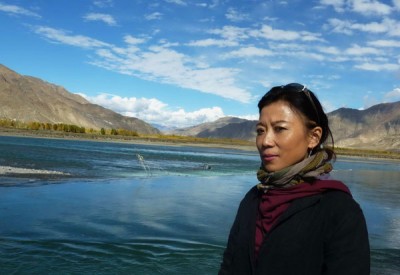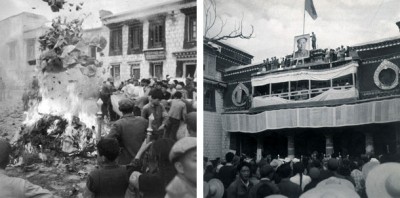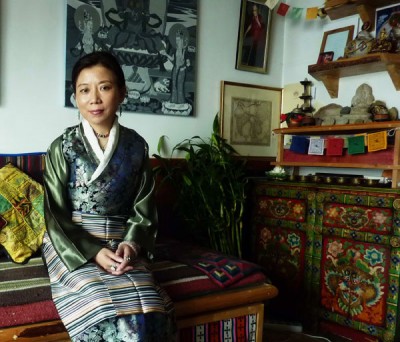Tsering Woeser: Fearless Reporting Behind China’s Great Firewall
by Joshua Barnes / May 10, 2011 / 1 Comment
Woeser’s online journalism has earned her more than awards and international recognition; it’s also earned her harassment and constant surveillance by the Chinese government. Undeterred, she continues to write, motivated by her desire to share the truth about today’s Tibet with the world.

Tsering Woeser [click image to enlarge]
I first tried contacting Tsering Woeser, a self-described “one-person online news station,” in November 2010 via email. At that time she had traveled from her residence in Beijing, China to her childhood home in Lhasa, Tibet. Lhasa is not the most secure place for a one-person news station that reports on developments inside Chinese-occupied Tibet via two widely followed blogs and a Twitter feed. In the two months that passed before Woeser confirmed my identity and sent responses to my questions, her blog Invisible Tibet was hacked for the fourth time; her Gmail and Facebook accounts were tapped; and malicious emails were sent to her contacts list.
The fact that Woeser is a pro-Tibet blogger has earned her public enemy status from the Chinese government, which tightly regulates Internet traffic. According to Free Tibet, a Tibetan liberation organization, the Chinese occupiers engage in systematic human rights abuses and seek to destroy Tibetan culture, religion, and language. Since 2004 the Chinese Communist Party (CCP) has required all Tibetan citizens to use an Internet access card, so they can monitor online activity.
The type of harassment Woeser experienced in November is nothing new. In 2004, Chinese authorities stated that her book Notes on Tibet contained “political errors,” an accusation which caused her to lose her job as an editor for the the Tibet Autonomous Region Literature Association’s journal. She started blogging the following year and her sites have been the target of cyber attacks. In 2008, her blog’s home page was replaced with an image of the Chinese flag and a message calling her the “Tibet Separatist” and urging violence against her.
That same year, Woeser was visiting her mother in Lhasa when the house was raided by Chinese police. “A man came into my room…and searched every corner,” she wrote in her essay “They, They…” “He opened a file folder, and the look on his face was like he had found a treasure. When he realized it was just material from my mother’s workplace, he looked so disappointed.” Woeser was taken to a police station where she was questioned and subjected to intimidation tactics for eight hours. She considers herself lucky that she wasn’t tortured.
Around the time of her arrest, pressure from overseas organizations like Reporters Without Borders prompted a spokesperson for the Chinese government to issue a statement claiming that accusations that they had arrested dissidents were “groundless.” Woeser believes she was released because China faced increased international scrutiny in the lead-up to the Beijing Olympics.
When questioned on the topic of her arrest, Woeser revealed distaste for her behavior: “I was shocked to realize how submissive I had been. Why did I let them take me away? Why did I answer every question they asked?” Such self-criticism, while harsh, isn’t difficult to understand; while resisting the CCP is a rugged road to take, it’s one that Woeser has been traveling on since she started her first blog, The Maroon Map.
Woeser’s journalism has been described as fearless by more than one source, including World Tibet News. Despite considerable risks, she documents what is important to her as a Tibetan, whether it be the preservation of Buddhist holidays outlawed by the CCP or an interview with a Tibetan monk following the March 2008 protests in Lhasa, which left 20 dead and over 4,400 participants in police custody. Even though her friends and family can also be punished for her work, Woeser openly answered my questions about her tangles with the government and accused the CCP of having a direct involvement with the repeated shutdown of her sites.

Photos included in Tsering Woeser’s Forbidden Memories. [click image to enlarge]
Forbidden Memories
Born in 1966, Woeser grew up in occupied Tibet and dreamt of being an embedded journalist reporting from the front lines. Sharing stories about Lhasa to her Chinese classmates when she was just 4-years-old prefigured her work as a blogger telling the story of Tibet to the world.
Despite being half Tibetan, her father was an officer in the People’s Liberation Army during China’s 1950 invasion and forcible annexation of Tibet. Woeser remembered questioning her father when she was young: “My father used to tell me to learn to walk with two legs: one for my own path and one to follow social expectations. I didn’t agree with him and asked, couldn’t one of the legs be broken eventually? He didn’t answer.”
When asked about her relationship with her father Woeser said: “This is not a simple question and I cannot answer it in a few words.” She is currently working on a novel about this topic, exploring her experience through a fictional character. “I need a moment of truth and intimacy to share unsettled feelings,” she said.
Her father’s involvement in the Cultural Revolution provided the material for her third book, Forbidden Memories: Tibet During the Cultural Revolution. During Mao’s “re-education” program thousands of Buddhist texts were burned and Buddhist temples across Tibet ransacked. These incidents are crucial to understanding the nation’s current condition of unrest. However these events have mostly been erased by CCP-enforced silence. In his introduction to Forbidden Memories, scholar and novelist Wang Lixiong writes that the most complete collection of records from the Cultural Revolution includes more than 10,000 files, transcripts, and other documents, but only 8 of those files are related to Tibet.
Woeser’s Forbidden Memories works to close this gap in history. It contains hundreds of unpublished photos taken by Woeser’s father during his People’s Liberation Army duty. The volume includes several essays by Woeser, and a collection of interviews she conducted with Tibetans from her father’s generation, which her mother helped translate into Chinese.
In 2006 the controversial Forbidden Memories was published in Taiwan. Woeser did not comment on her father’s level of involvement in the project.

Tsering Woeser [click image to enlarge]
“I’m a Tibetan Living in Exile”
On December 17, 2007 Woeser was awarded the Norwegian Authors’ Union Freedom of Expression Award for “bravely choosing to publish her books, despite content deemed controversial by the Chinese authorities.” She was unable to attend the award ceremony in Oslo because, for the fifth year in a row, the Chinese government denied her a passport. Her request was denied on the grounds of “national security,” a common accusation against dissidents.
In July of 2008 Woeser filed a suit against the Chinese government and took the case to Changchun Intermediate Court, where her husband is registered as a permanent resident. But her suit has been routinely delayed. “My chance of getting a passport is very slim,” she said.
Even if she could leave the country, Woeser said the trip would only be temporary. “I still want to stay in China because it’s closer to Tibet. I would like to travel abroad, if I have a chance, just to see what’s out there. But I will return,” she said.
A profile on Phayul.com, a web portal for Tibetan news and opinion, notes that “Woeser’s writing provides a stark immediacy to events and brings them up-close and personal as no report by foreign journalists or ‘experts’ can, not even exiled writers like [Jamyang Norbu].”
However, Woeser considers herself an exiled writer. She said she is “a Tibetan living in exile in China, just like hundreds of thousands of Tibetans.” The CCP maintains Tibet is officially part of China and places restrictions on Tibetan cultural practices, such as requiring Tibetan monks to attend “patriotic education” meetings that belittle the Dalai Lama, according to The Economist.
Woeser is working to prevent the CCP from completely erasing Tibetan history. “If I don’t record and speak out, our nation will be silenced, history will be altered…and younger generations will have no way of knowing. This one-person media is the only weapon given to those whose rights have been deprived, and I will carry it until the end,” Woeser stated.
Today Woeser isn’t taking notes while dodging gunfire like her childhood dream. Instead she is dodging cyber attacks to disseminate her work despite CCP interference. Even if her sites are shutdown temporarily, Chinese and Tibetan news sources have reprinted many of her essays, and her work has an English-language home on Highpeakspureearth.com. Threats and comments calling her a “Tibetan dog” don’t make her renounce her ways: “I might get into trouble, but I don’t care,” she said. “I want to let more people understand the situation and history of Tibet. Persistence is the key and change will come, sooner or later.”
From Woeser’s “Flying”
Oh, two wings,
One is wisdom, one is courage,
I would not wish to be a bird,
Too smart or too imprudent.
…
Only with both,
Can you fly out of the three realms.





One Comment on "Tsering Woeser: Fearless Reporting Behind China’s Great Firewall"
I think this is among the most important information for
me. And i am glad reading your article. But wanna remark on some general things,
The site style is ideal, the articles is really nice :
D. Good job, cheers